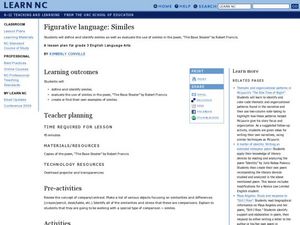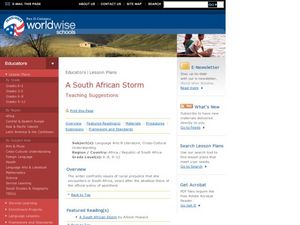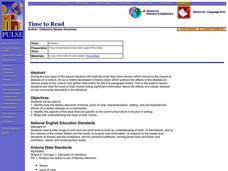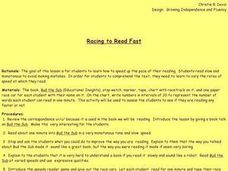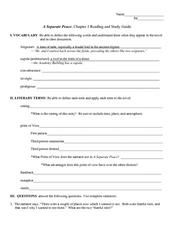Curated OER
Use of Personification and Imagery in Poetry
A reading of Theodore Roethke’s dark "Root Cellar" and Sylvia Plath’s more abstract "Mirror" launches a discussion of imagery and personification in poetry. After finding examples of personification in the poems, class members...
Curated OER
Colorful Creative Writing Rebus
Students read rebus samples from various sources. They write poems about colorful places, including detailed descriptions of people, scenery, and objects. Students create small, relevant illustrations to communicate meaning using symbols...
Curated OER
Visual Art: Independence Days Around the World
Students research patriotic holidays from around the world. After reading about their own country's independence day, they choose another country and examine the traditions and symbols associated with it. Using cardboard, ribbon, and...
Curated OER
People Alliteration
Young readers discover alliteration as they read about it and fill in the blanks in 12 questions using alliterative words.
Curated OER
Animal Alliteration
Second graders discover alliteration as they read about it and fill in the blanks in 12 questions using alliterative words.
Curated OER
Figurative Language Similes
Learners illustrate a simile. In this figurative language lesson, second graders are introduced to similes. They read the story Quick as a Cricket and talk about the similes used. Everyone chooses a simile and draws a picture to go along...
Curated OER
History Personified
In 1856 Congressman Preston Brooks of South Carolina beat Senator Charles Sumner of Massachusetts over the head with a cane. This event, which highlighted the acrimonious debate over the expansion of slavery, is the focus of a paper...
Curated OER
A South African Storm
Students explore racial prejudice in South Africa through the reading of "A South African Storm" by Allison Howard. In this cultural and geography lesson, students discuss ethnicity and prejudices and cite examples from the letter....
Curated OER
Descriptive Writing: Parrot in the Oven
After reading a selection from Victor Martinez's Parrot in the Oven, pupils use the graphic organizer to decipher the sensory details within the descriptive paragraph. They list various details under the appropriate sense ("see," "hear,"...
Curated OER
Alliteration: Poetry
Explore alliteration using this resource. This short presentation discusses the use of alliteration in poetry. Learners will love reading these silly sentences, and also creating some of their own.
Curated OER
My Monster
Explore descriptive language. Learners read a series of similes describing the eyes, teeth, skin, and other features of a monster. Then, they describe their own imaginary monster using similes and adjectives. Very creative!
Curated OER
Tall Tales: Larger Than Life Stories
Review the elements of tall tales with your class. Take a look at their genesis and purpose. Different types of figurative language found in tall tales are included such as hyperbole, simile, and metaphor. Before reading an American tall...
Pearson
Lesson Plan: Introduction to Plato’s Cave
Can we perceive reality or are we chained by preconceptions that limit our vision? Plato’s allegory “The Cave” serves to introduce nascent philosophers to Plato’s dialogues and hopefully to engender a love of ideas and discourse. A...
Curated OER
Time to Read
Students identify how the literary elements of theme, point of view, characterization, setting, and plot illustrate the effects of a certain disease on a community. They identify the aspects of the book that are specific to the...
Curated OER
Racing to Read Fast
Students identify and interpret how to speed up the pace of their reading. Then they read slow and monotonous to avoid making mistakes. Students also read to comprehend the text that they need to identify to vary the rates of speed at...
Curated OER
Nibble, Nibble, Little Mouse
Students complete activities to analyze points of view in different texts. In this point of view lesson, students read Hansel and Gretel and The Magic Circle and discuss the points of view. Students choose a character from the story and...
National Endowment for the Humanities
Nathaniel Hawthorne and Literary Humor
Young scholars examine Nathaniel Hawthorne's style of humor and compare it to other humorists. They discuss the purpose of literary humor and determine how it develops characters and plots in stories. They analyze the use of different...
Curated OER
Power Poetry
Young scholars use poetic devices to discuss political issues. In this cultural diversity lesson, students listen to the president's State of the Union address and write poetic pieces that express their opinions about issues the...
Curated OER
A Separate Peace: Chapter 1 Reading and Study Guide
In this reading and study guide worksheet, students define 3 vocabulary words, define 5 literary terms, and respond to 14 short answer questions pertaining to chapter 1 of John Knowles's A Separate Peace.
Curated OER
Charge-Coupled Devices (CCDs)
Students explore CCDs or Charge-Coupled Devices. For this digital devices lesson, students examine how CCDs are constructed, collect light, and create a digital signal.
Curated OER
A Separate Peace: Chapter 2 Reading and Study Guide
In this reading and study guide worksheet, learners define 4 vocabulary words, define 3 literary terms, and respond to 17 short answer questions pertaining to chapter 2 of John Knowles's A Separate Peace.
Curated OER
Poetry of The Great War: 'From Darkness to Light'?
Students examine World War I poetry for historical context, poetic devices, and participate in a class discussion. They write an analysis of the poetry's form and its content.
EngageNY
Grade 9 ELA Module 1, Unit 2, Lesson 7
Readers analyze David Mitchell's techniques for introducing and developing the mystery surrounding Madame Crommelynck in the "Solarium" chapter of his novel Black Swan Green.
Kimskorner4teachertalk
Foreshadowing
Take a look at foreshadowing in any text by recording instances of foreshadowing in a straightforward graphic organizer. Learners note down the event, the clue, and the page number for five foreshadowed events. There is also space for...







